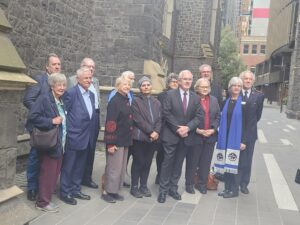
Jenan Taylor
18 July 2024
Advocates want more action to keep young people from reoffending in Victoria despite proposed changes to the state’s youth justice laws.
They have welcomed raising the age of criminal responsibility from 10 to 12 but believe other proposed changes fail to address the rates of incarceration.
Advocates say addressing the causes of youth offending rather than locking up children would make a difference to the incarceration rates, particularly those of First Nations youths.
Senior Indigenous cleric and school chaplain the Reverend Canon Helen Dwyer said the proposed laws fell short of keeping young children out of jail, particularly Indigenous youths.
Read more: Queenslanders will be less safe if kids are less safe: Faith leaders
Canon Dwyer said Aboriginal and Torres Strait Islander children were more likely to be in the child protection system, a cohort that often encountered the judicial system.
She said they were also more likely to languish in remand centres because they were also less likely to be granted bail.
Canon Dwyer said addressing causes, including family breakdown, could lead to breakthroughs about how to prevent offending.
She said youths in the child protection system needed stability rather than being moved around, and the community and the state needed to be better at trying to bring consistency in their lives.
Canon Dwyer said it grieved her the age of responsibility would only be raised to 12 because most 12-year-olds were too under-developed to grasp the repercussions of their actions
Victoria’s Youth Justice Bill 2024 includes a measure to enable police to transport and place into care children under 12 whom they believe to be a risk to the community and themselves.
The government would also trial electronic monitoring under the proposed reforms.
University of Divinity School of Indigenous Studies Committee chair the Reverend Janet Turpie-Johnstone said the age of responsibility needed to be higher than 12 because when children were criminalised they were often jailed alongside adult criminals.
Read more: Prison could be revolving door for children under new Queensland law: Indigenous bishop
Ms Turpie-Johnstone said the reforms needed to be extra considerate about Aboriginal youths in the system, as ingrained poverty caused by unjust national and state laws led to Aboriginal people becoming caught up in the criminal system.
She said First Nations-led initiatives were best suited to addressing the offending because they understood why Indigenous people were hurt and angry, and likely to break the law.
Ms Turpie-Johnstone said this included long term counselling programs that worked among the communities and with individuals.
Common Grace national director Gershon Nimbalker said raising the age of criminal responsibility was symbolic and practical.
Mr Nimbalker said nationally young Indigenous people were 50 times more likely than their peers to be arrested and raising the age showed a concern for justice and compassion.
He said he wanted to see more children safe, free and flourishing and shown they were loved by communities and authorities, rather than being locked up.
The incarceration rate for young Aboriginal people in Victoria was 51 per 10,000 people compared to 4.8 per 10,000 people for non-Indigenous youths in 2022-23, according to the Sentencing Advisory Council.
Read more: Ten years bringing hope to dark places
The Human Rights Law Centre said the planned new laws would fail children and communities as engagement with the criminal legal system, including first contact with police, harmed children.
Acting engagement director Thomas Feng said Victoria needed to focus on providing wrap-around services for them instead that helped them better connect with education and with their communities.
“Being tough on crime is bad for the kids. It doesn’t help them, it just criminalises them,” Mr Feng said.
A Victorian government spokesperson said Victoria would be the first state to raise the age of criminal responsibility to 12, because 10 and 11-year-olds belonged in school, not the criminal justice system.
The spokesperson said once this was implemented, Victoria would only raise the age to 14 if an appropriate alternative service model was established by 2027.
They said this work was in consultation with First Nations communities and organisations.
The Victorian Aboriginal Legal Service was contacted for comment.
This post was updated on 22 July to reflect the Victorian government’s response that the state would raise the criminal responsibility age to 12 because younger children did not belong in the criminal justice system.
For more faith news, follow The Melbourne Anglican on Facebook, Instagram, or subscribe to our weekly emails.







